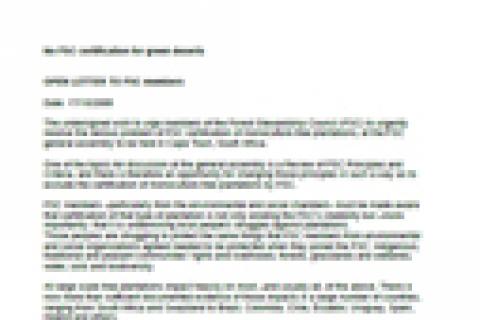Sent by World Rainforest Movement, Forest Peoples Programme and Environmental Defense, on behalf of 47 International NGOs.
Mr. James D. Wolfensohn
President
The World Bank
1818 H Street, NW
Washington, D.C. 20433
Via Fax: 202 522 3031 & Mail
Dear Mr. Wolfensohn,
We thank you for the opportunity to provide comments on the Bank’s draft policy for adjustment lending, now named Development Policy Lending (O.P. 8.60).
Other information
by Andrew Cock.
In "Plantations are not Forests. Commercial Tree Plantations in the Mekong Region".Vol. 9 No. 3 March - June 2004. Published by Towards Ecological Recovery and Regional Alliance (TERRA)
Pulp and paper production in Kenya is presently dominated by one firm, Pan African Paper Mills (Panpaper), which is a joint venture between the Kenyan Government, the World Bank’s private investment arm International Finance Corporation (IFC), and Orient Paper Mills, part of the Birhla group from India. The pulp mill was established in 1974 and is based in Webuye town, with a population of some 60,000 people, on the banks of the Nzoia River which drains into Lake Victoria.
‘Pulping the South’ by Larry Lohmann and Ricardo Carrere was a watershed publication for many groups and individuals around the world. Concerned people had been aware of many issues and problems associated with the expansion of industrial monoculture tree plantations in Southern countries, but it was this WRM publication that made the world sit up with a jolt.
Since 1996, in an attempt to control pollution, China's State Environmental Protection Administration has closed thousands of pulp and paper mills. "A significant portion of urban as well as rural water pollution problems came from industry and, in particular, the pulp and paper industry," commented the World Bank in a 2000 report about China's pulp and paper industry.
In the early 1980s the Indonesian government launched an ambitious forestry plan entitled "Industrial Timber Plantation (HTI) and Pulp Industry Development." In the early stages of its development, pulpwood plantations were claimed to rehabilitate degraded land and to reduce the pressure on natural forests. This misleading propaganda was indeed intended to disguise an ambitious plan of the Indonesian government for the country to become a world major pulp and paper producer.
Established in 1989, Advance Agro Public Company Limited is located in Prachinburi province. Its main business is producing and selling pulp and printing and writing paper. The company’s production capacity of bleached kraft pulp is 175,000 tons per year. It also produces bleached short-fibre pulp for two mills operated under Advance Agro Pulp, with a combined capacity of 427,000 tons as well as printing and writing paper, with an annual capacity of 250,000 tons. Along with its subsidiaries (High Tech Paper and Advance Paper), Advance Agro has an annual production capacity of 500,000 tons.
Just meters beyond the outer wall of Tan Mai Paper mill, a thriving industry exists in the shade of coconut trees. In ponds where rice fields used to lie, local villagers stand chest deep in wastewater from the factory. Young men strain to lift nets out of the ponds, filled to the brim with the catch of the day: paper fiber emitted in the mill's wastewater.
Greenpeace investigation reveals Swiss-German company bribing officials in Cameroon, Democratic Republic of Congo and Republic of Congo.
Download full document as pdf
From May 3 to 14, 2004, governments from around the world met in the hallowed halls of the United Nations in Geneva, Switzerland for the fourth session of the United Nations Forum on Forests (UNFF4). Eleven members of the Global Caucus on Community Based Forest Management attended the first week of UNFF4, with the aim of learning about the UNFF process, and where possible, to advocate for community based forest management. It is fair to say that the Caucus’ expectations for UNFF4 were low in terms of what we anticipated governments would achieve through their deliberations.
Freddy Molina is a board member of the Asociacion Coordinadora Indigena y Campesina de Agroforesteria Comunitaria Centroamericana (ACICAFOC). In English, this translates into the Coordinating Indigenous and Peasant Farmers Association on Community Agro-Forestry in Central America. ACICAFOC is a non-profit, social community-based organization from Central America, which brings together associations, cooperative societies, federations and grass roots organizations lead by small and medium agro forestry producers, indigenous peoples and farmer peasants.
Maybe it's something in the water in Geneva that causes temporary memory loss. Or maybe it's the coffee. Whatever, the participants at the fourth meeting of the United Nations Forum on Forests (UNFF-4) held in Geneva in May seemed to be suffering from a form of collective amnesia.



